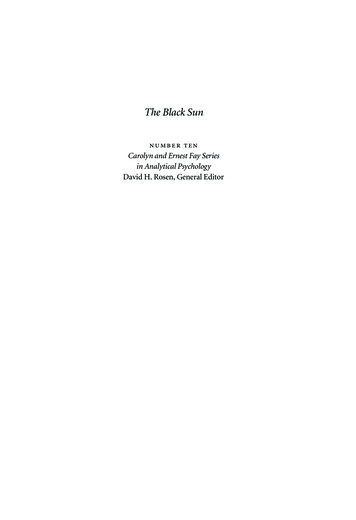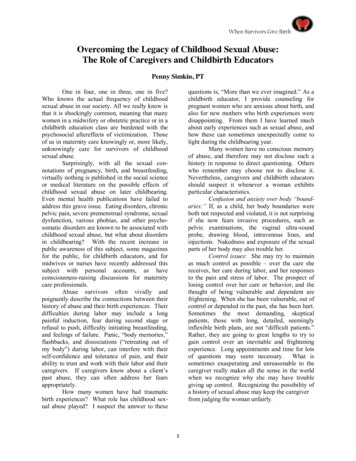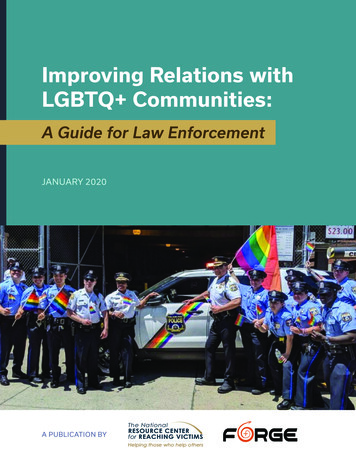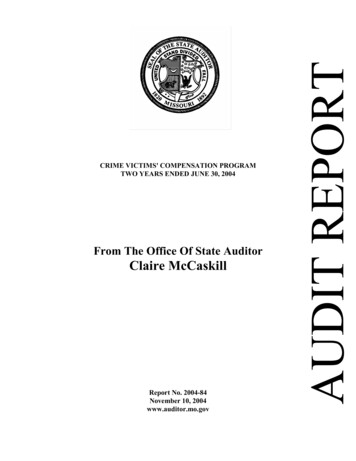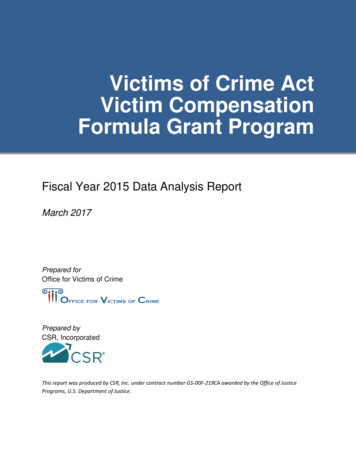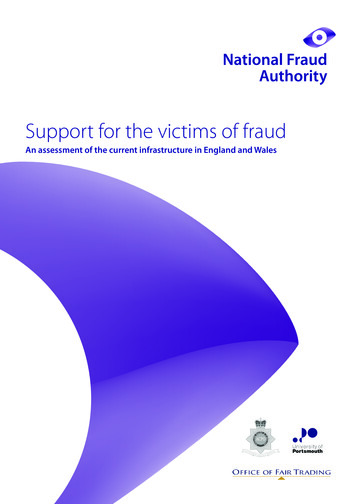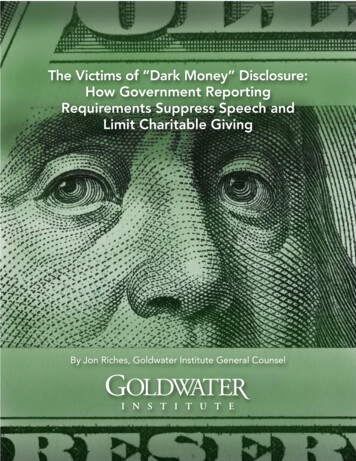
Transcription
The Victims of “Dark Money” Disclosure:How Government ReportingRequirements Suppress Speech andLimit Charitable GivingBy Jon Riches, Goldwater Institute General Counsel
“Anonymity is a shield from thetyranny of the majority.”-McIntyre v. Ohio Elections Commission, 514 U.S. 334, 357 (1995)EXECUTIVE SUMMARYAnonymous political speech has been essential to democratic discourse since the founding of ourrepublic. Ratification of the U.S. Constitution was primarily debated through a series of anonymouspapers. Yet in recent years, anonymous political speech has been under attack by so-called “darkmoney” critics, who demand that government expose the identities of individuals, businesses,labor unions, and nonprofits that spend money to participate in political dialogue. Couched as“transparency” measures, “dark money” disclosure mandates are often used as excuses to silencedisfavored speech. Troublingly, disclosure mandates are sweeping the country in the form of vagueand overbroad regulations reaching the activities of 501(c)(3) nonprofit organizations – groupsthat operate in nearly every sector and industry in the United States and represent views acrossthe political and philosophical spectrum. These mandates have diluted political dialogue, invitedharassment and retaliation against speakers, and chilled speech and association. Although theConstitution protects political and private associations against compelled disclosure, federal courtshave often failed to enforce those protections. Therefore, liberty advocates should litigate for greaterconstitutional protection of free speech and association rights. At the same time, several simplepolicy reforms can protect nonprofits from efforts to silence opposition and endanger free thought,speech, and association.I. INTRODUCTION“Anne,” afraid to give her real name, was alarmed when she heard an early morning poundingon her front door. “It was so hard. I’d never heard anything like it. I thought someone was dyingoutside.” When she ran to open the door, armed police came pouring into every room of the house,yelling orders, cornering her family, and seizing Anne’s private property. The police reportedlyverbally abused Anne and her family, instructing them not to contact her lawyer or tell anyone aboutthe early morning raid. Anne’s neighbors watched from the outside.What was Anne’s crime? She had supported Wisconsin’s 2011 Act 10 – Governor Scott Walker’spublic union reform bill – and other political causes. Anne wondered, “Is this America?”1The Victims of “Dark Money Disclosure” 2
Anne’s story is one of several reports of political harassment and intimidation in Wisconsin’s “JohnDoe” investigations, so named because of the extraordinary powers granted to law enforcement tocompel disclosure of information and maintain the secrecy of their investigations.2 Initially a probeinto the activities of Governor Walker and his staff, the investigation expanded to reach nonprofitsnationwide that made independent political expenditures in Wisconsin, including the League ofAmerican Voters, Americans for Prosperity, and the Republican Governors Association.3Eric O’Keefe, director of the Wisconsin Club for Growth, which advocates for lower taxesand limited government and was targeted in the raids, sued in federal court to block subpoenasdemanding the identity of the Club’s donors.4 The district court ruled in Mr. O’Keefe’s favor, findingthat prosecutors exceeded their lawful authority by pursuing Mr. O’Keefe’s group “for exercisingissue advocacy speech rights that on their face are not subject to the regulations or statutes thedefendants seek to enforce.”5No criminal charges have yet been filed in the nonprofit John Doe Probe.6 But it serves as achilling example of one state’s attempt to criminalize political speech. Indeed, it shows the dangerto free speech when regulators use their authority to silence and suppress speech with which theydisagree. Even if charges are never brought, Mr. O’Keefe told reporters that the broad reach of thesubpoenas in his case, “froze my communications and frightened many allies and vendors of the protaxpayer political movement in Wisconsin and across the country.” He lamented, “[T]he process isthe punishment.”7The seemingly politically motivated attempts to suppress speech in Wisconsin led Anne toexclaim that this is not the America she recognizes. Nor is it consistent with this country’s longtradition of respecting the right to free association and anonymous speech of all kinds.Indeed, ratification of the U.S. Constitution was debated through a collection of anonymouspapers. The Federalist Papers, written under the pen name “Publius,” are the seminal writingsadvocating for state adoption of the U.S. Constitution. Considering the personalities involved,regional rivalries at the time, and the importance of focusing the debate on the message ratherthan the messenger, it is unlikely that the Federalist Papers would have been as effective hadtheir authors, Alexander Hamilton, James Madison, and John Jay, been forced to disclosetheir identities.8 Yet, under some present-day state laws requiring disclosure of individuals andgroups speaking on political issues, Publius’s foundational expositions would likely be consideredpublications by a “political committee,” which would be forced to disclose its authors or cease itspublications.The Victims of “Dark Money Disclosure” 3
Thus, the danger is clear: broad disclosure laws empower government to silence dissentingopinions by ensnaring constitutionally protected activity. If the authors of the Federalist Paperswould be subject to forcible disclosure under current campaign finance laws,9 then so would otherissue advocacy groups, including charitable organizations established under § 501(c)(3) of the U.S.tax code.The proponents of so-called “dark money” disclosure have already swept these organizationsinto the ambit of laws designed to regulate candidate campaign financing. And until constitutionallyprotected speech is properly safeguarded by courts and legislatures throughout the country, wemight all begin to wonder, like Anne, how these attempts to silence speech can happen in America.A. What is “Dark Money?”The proponents of mandatory reporting of private civic activities have won a major marketingvictory by the widespread use of the phrase, “dark money.” As one commentator put it, “Darkmoney. The name itself carries ominous undertones, undertones that critics of this relatively newcampaign-finance phenomenon claim reflect a genuine threat to democracy.”10 But the term ismisleading. “Dark money” would be more aptly referred to by what those who find free speechobjectionable actually support – mandated government disclosure. The use of such terms isintended to cast suspicion on those who contribute to various civic causes so the debate revolvesaround ad hominem attacks rather than engaging on the issues.So, what is “dark money”? It conjures images of shady political operatives greasing the palmsof politicians in dark, smoked-filled rooms. But does it also apply to traditional political activities,like you and your neighbor contributing your time and money to civic and social activities thatyou support? And is it really a threat to democracy, or are those who seek to silence the voice ofopposition and limit speech the real threats?“Dark money” generally refers to funds spent for political activities by businesses, unions,nonprofit organizations, and individuals who are not required by law to disclose the identities of theirdonors. Depending on where supporters of government disclosure draw the inherently arbitrary line,dark money could refer to donations made to the American Civil Liberties Union (“ACLU”) or to yourlocal church or soup kitchen.The Victims of “Dark Money Disclosure” 4
As a general matter, all spending that calls for the election or defeat of a political candidate orconstitutes “electioneering communications” involves some level of disclosure to the government.In fact, there are more disclosure obligations on the books today than at any other time in ournation’s history.11 Nevertheless, some supporters of government disclosure claim that current lawsdo not go far enough. They assert that certain charitable and social welfare organizations, includingthose organized under § 501(c) of the federal tax code, should be forced to disclose the identities oftheir individual donors when those organizations engage in political activity, even if that is not theirprimary function.12Those calling for the elimination of “dark money” are thus attempting to dramatically extendthe reach of government-mandated disclosure to a wide variety of organizations, activities, andcommunications.Advocates for expanded disclosure call for such dramatic and far-reaching regulations despite thefact that “dark money” is not a pervasive element in American politics. Some government disclosureadvocates claim that so-called “dark money” expenditures constitute a significant portion of politicalspending in the United States.13 But the characterization is inaccurate. In the 2014 election cycle,the Federal Elections Commission reported approximately 5.9 billion in total spending on federalelections.14 Of that 5.9 billion, roughly 173 million came from groups that are not required by lawto disclose donors.15 This represents a mere 2.9 percent of all spending on federal elections – hardlya significant portion. In fact, this figure represents a decline from the 2012 election cycle, where suchexpenditures amounted to 4.4 percent of spending on federal races.16 As the Center for CompetitivePolitics observed from the 2012 election cycle, “Nearly all of the organizations that financed suchindependent expenditures . . . were well-known entities, including the U.S. Chamber of Commerce,the League of Conservation Voters, the National Rifle Association, Planned Parenthood, the NationalAssociation of Realtors, the National Federation of Independent Business, NARAL Pro-ChoiceAmerica, and the Humane Society.”17 As a result, there is no secret as to what causes and issues suchgroups support.Under existing campaign finance laws, the identities of these groups must be revealed whenmaking direct contributions to candidates or political parties or engaging in other electioneeringcommunications. Additionally, donor identities must be disclosed when they specifically earmarktheir donations to nonprofit organizations to be used for electioneering communications. Thosetypes of donations can hardly be characterized as “dark money” in need of further regulationwhen under existing disclosure rules, anyone can see that the NRA contributed to Candidate Xand Planned Parenthood contributed to Candidate Y. The positions of those organizations areThe Victims of “Dark Money Disclosure” 5
well known. Characterizing those expenditures as “dark money” is, therefore, disingenuous. Butforcing further disclosure of donor identities is at best unnecessary, as donors may contributeto organizations to support the overall mission rather than any specific political candidate. Theirdonations are intended to support certain issues, not politicians.Claims that “dark money” is distorting American politics are even more tenuous when leveled at501(c)(3)s, considering these nonprofit organizations are prohibited from participating in any partisanpolitical activity.B. What are 501(c)(3) Nonprofits?There are nearly one million tax-exempt charities in the United States organized under § 501(c)(3)of the federal tax code.18 These organizations include schools, churches, hospitals, art centers, publicradio stations, research foundations, and other groups dedicated to a range of issues from improvingthe environment to providing legal services to indigent litigants.19 Nonprofit 501(c)(3) organizationsoperate in nearly every industry and sector in the United States and abroad, including education,health care, culture, sports, animal care and zoos, foreign affairs, and the humanities, among manyothers.20 The Special Equestrians of Vero Beach, Florida, which provides therapeutic horsebacktraining to physically and mentally challenged individuals – is just one example of the one million501(c)(3) organizations.21The social and economic impact of 501(c)(3)s in the United States is sizeable. According to theUrban Institute, 501(c)(3) public charities reported 1.65 trillion dollars in revenue in 2012, thoughthe vast majority (66.4 percent) had less than 500,000 in gross receipts. It is estimated that thenonprofit sector contributed 887.3 billion dollars to the U.S. economy in 2012, 22 and employedmillions of Americans – both for compensation and as volunteers.Some 501(c)(3) organizations are organized as public and social benefit groups, such ascommunity foundations and public interest or civil rights organizations. These groups run the entirepolitical spectrum. The ACLU, the National Rifle Association, Focus on the Family, and the CatoInstitute, for example, are all 501(c)(3) public charities. The organization for which I work – theGoldwater Institute – is a 501(c)(3) organization, dedicated to advancing limited government, freemarket, and liberty-oriented public policy solutions. The Center for American Progress – a researchand education organization that advocates for progressive policies and increased governmentprograms – is also a 501(c)(3) organization.The Victims of “Dark Money Disclosure” 6
Despite the broad philosophical diversity among 501(c)(3) public charities, an importantdistinction between them and other 501(c) organizations is that 501(c)(3) groups are prohibited fromengaging in any express political activity involving political candidates .23 Other 501(c) organizations,notably 501(c)(4) groups, can advocate for the election or defeat of political candidates, so long asthose activities are not the organization’s primary activity. 501(c)(4) organizations can also engage inunlimited lobbying to further the purpose of the organization. By contrast, 501(c)(3) public charitiescan only engage in a limited amount of lobbying under certain circumstances.24Of course, the entire point of a public or social benefit organization is to advance an issue or setof issues through public dialogue, including political dialogue. According to government disclosureadvocates, however, people should not be able to donate privately to the charities of their choiceif those entities engage in any political dialogue. What does this mean in practice? A donation toPlanned Parenthood becomes a public record. Member dues to the NRA or Greenpeace wouldbe reported to the government and disclosed to the public. Even donors to a theatre group thatengaged in political activity on an issue affecting the arts would be made public. Under theseproposals, how many donations would be withheld? How much speech would be silenced?Yet despite these dangers, trends are developing nationwide to compel the disclosure of privatedonors to 501(c)(3) groups.II. GATHERING TRENDS FOR MANDATORY REPORTINGAND DONOR DISCLOSUREAdvocates of mandatory government reporting have engaged in a multi-pronged attack onanonymous speech to force more organizations, including 501(c)(3) nonprofits, to reveal theirprivate donors. After a federal disclosure bill failed by a single procedural vote in the U.S. Senate,25government reporting advocates have largely focused their attention on state legislatures, whereseveral proposals have recently passed or nearly passed that would require a wide range ofmandatory government reporting. Additionally, state regulators have begun to demand privatedonor information under their putative authority to regulate charitable fundraising. Many of thesemandates have often been subtle but sweeping; for example, by expanding the definition of an“electioneering communication,” or of a “political committee.” In many instances, these efforts haveresulted in forcible disclosure of both private individuals and nonprofit entities whose purpose is notprimarily political.The Victims of “Dark Money Disclosure” 7
A. Legislative Efforts to Mandate Donor Disclosure.In recent legislative sessions, several states have considered or passed statutory measuresmandating that private organizations reveal their donors.26 These efforts have generally come in oneof two forms: dramatically expanding the definition of what constitutes (1) a “political committee” or(2) an “electioneering communication.” Many of these efforts have direct implications for 501(c)(3)organizations, particularly those that engage in limited lobbying.27 Additionally, the broad sweep ofthese proposals and statutes have ensnared private citizens engaging in grassroots political activity.For example, in 2013, Nevada enacted a law that amended the state’s campaign finance laws toexpand the definition of a “committee for political action.”28 The amended law defines a “committeefor political action” as:Any business or social organization, corporation, partnership, association, trust,unincorporated organization or labor union Which does not have as its primary purposeaffecting the outcome of any primary election, general election, special election or anyquestion on the ballot, but for the purpose of affecting the outcome of any election orquestion on the ballot receives contributions in excess of 5,000 in a calendar year ormakes expenditures in excess of 5,000 in a calendar year.29In other words, any group that receives or spends more than 5,000 on an election or ballotquestion is deemed a political committee, regardless of the overarching nature or purpose of theorganization. All so-deemed “committees for political action” must file contribution and expensereports.30Under this amended law, 501(c)(3) organizations that, for example, support a ballot measure,would almost certainly have to disclose the identities of all their donors. This is true even though thatorganization would not engage in political activity as its primary purpose. Moreover, this law couldeasily ensnare small grassroots groups, like a group of neighbors who get together to advocate foror against a ballot question. Even though such a group’s purpose may be political, treating them asif they were a sophisticated political action committee, with all attendant registration and disclosurerequirements, deters activities that, as described below, are constitutionally protected and ought tobe encouraged.Such a broad definition of “political committee” even ensnared a concerned individual inArizona. In 2011, Dina Galassini opposed a bond proposal set to appear on the Town of FountainHills’ November ballot. Ms. Galassini attended town hall meetings and spoke out against themeasure. One month before the election, she also sent a personal e-mail to 23 friends and neighborsasking them to join her in opposing the bond by writing letters and attending a protest where theyThe Victims of “Dark Money Disclosure” 8
would hold signs on a street corner. Shortly after sending her e-mail, town officials sent Ms. Galassinia “cease and desist letter,” claiming that she must register as a political committee, with attendantregistration and disclosure requirements, under Arizona law prior to engaging in such commonplacepolitical activities. As an average citizen concerned about her community, Ms. Galassini wasfrightened by the letter from town officials, and cancelled her two planned protests.31At the time, Arizona law defined “political committee” in “a 183-word sentence,” as the federaljudge observed in the lawsuit that challenged the town’s actions.32 Under that law, any group thatspent more than 250 had to register with the government before distributing literature or makingsigns pertaining to campaign activities.33Fortunately, Ms. Galassini was able to secure pro-bono legal representation from a public interestgroup, the Institute for Justice, to challenge this broad and burdensome definition of “politicalcommittee.” In striking down Arizona’s definition of “political committee,” the court observed,“In this case, it is not clear that even a campaign finance attorney would be able to ascertain howto interpret the definition of ‘political committee.’”34 The court went on to note that the practicaleffect of Arizona’s campaign finance regulations was to create a “severely demanding task” for smallgroups wishing to engage in protected political speech.35 Thus, not only did Arizona’s definitionof “political committee” burden the speech of small nonprofits organized under 501(c)(3), but itsmuzzling reach extended to everyday citizens wishing to join together in small groups to address thepolitical issues of the day.State legislatures have also sought to expand the definition of “electioneering communication”to require 501(c)(3) nonprofits and other small groups to disclose their donors simply for speakingabout political issues. For example, the Minnesota legislature recently considered a pair of bills thatgreatly expanded the definition of “electioneering communication” to include any communicationthat (1) refers to a candidate, (2) is distributed within 30 days of a primary election or 60 days ofa general election, and (3) “can be received by more than 1,500 persons.” Such communicationsinclude “printed material” such as billboards and signs. These bills would have required theorganization to turn over the “name, address, and amount attributable to each person” whodonated more than 1,000 used for these so-called “electioneering communications.”36 Given thebroad scope of this definition of “electioneering communications,” these bills would likely affect501(c)(3) nonprofits, that, for example, published a voter guide, and require that such groupsdisclose their donors.These statewide legislative efforts to compel government reporting of donations to privatenonprofits have become more prevalent and widespread. Fortunately, many have been defeatedby the voters themselves at the ballot box. Others, however, have survived. Those that do tendto obfuscate the issue and avoid clear First Amendment objections by redefining terms suchThe Victims of “Dark Money Disclosure” 9
as “political committee” or “electioneering communication.” Given the steady drumbeat ofgovernment reporting advocates, however, it is likely these legislative efforts will continue in statesacross the country. At the same time, state regulators are using their powers to compel disclosureeven where a state’s statutory scheme does not mandate as much.B. Regulatory Efforts to Compel Disclosure.Government reporting advocates – either in tandem with legislative efforts or whenlegislative efforts have been unsuccessful – have been using the power of regulatory agenciesto force nonprofit organizations to reveal their donors. These efforts attack the lifeblood of501(c)(3) organizations – the ability to fundraise – giving nonprofit organizations the untenablechoice between ceasing fundraising activities in a particular state or invading the privacy of theorganization’s donors. The most aggressive such efforts are occurring in California and New York.In order to solicit charitable contributions in California, nonprofits, including 501(c)(3)organizations, must register with the California Registry of Charitable Trusts, which is administered bythe Department of Justice. As part of the registration process, 501(c)(3) nonprofits have historicallysubmitted a redacted IRS Form 990 to state regulators. That form did not include the names or otheridentifying information of donors. In 2014, however, California attorney general Kamala Harris begandemanding that 501(c)(3) nonprofits submit an unredacted Form 990 (Schedule B) that includesthe names, addresses, and contribution levels of donors.37 Even worse, once this information isturned over to the state government, California law arguably requires government officials to makethese records available to the public via public records requests.38 In other words, the chief lawenforcement officer in the state of California mandated that private charities disclose their privatedonors as a precondition to, as we will see in Section IV of this paper, engaging in constitutionallyprotected speech and association.New York attorney general Eric Schneiderman has demanded the same information from 501(c)(3)nonprofits under the same auspices.39 Existing statutes and regulations in either state do not supportthese unilateral regulatory actions.Unsurprisingly, these unprecedented and alarming power grabs by two state attorneys generalhave been subject to constitutional challenges in federal court.40 Ultimately, the question of whether501(c)(3) nonprofits must disclose their private donors will need to be resolved by the U.S. SupremeCourt.41 In the meantime, it is clear that government reporting advocates are finding sympatheticbackers in regulatory agencies to demand private information – the disclosure of which state lawoften does not require and the Constitution forbids.The Victims of “Dark Money Disclosure” 10
III. THE DANGERS OF DISCLOSUREProponents of government-mandated disclosure have set forth several arguments for compellingprivate charitable organizations to disclose their donors. Those arguments range from the wrong butperhaps well-intentioned to the nefarious. In any event, the strongest arguments for governmentreporting are easily eclipsed by the dangers of disclosure. On the soft end of the spectrum arethose government reporting advocates who claim they are not seeking to prevent speech, but onlyto inform the public of who is speaking.42 On the hard end of the spectrum are partisan politicaloperatives who wish to use disclosure mandates to silence opposing views. As Arshad Hasan,executive director of the anti-privacy group ProgressNow put it, “The next step for us is to takedown this network of institutions that are state-based in each and every one of our states.”43 Asimilar sentiment was echoed by the sponsor of the DISCLOSE Act, the federal bill that wouldhave mandated greater disclosure by nonprofit organizations, when he candidly proclaimed, “thedeterrent effect on [political speech] should not be underestimated.”44 Regardless of motive, thedangers of disclosure are far outweighed by any putative benefits.Private association is a fundamental part of our nation’s history and underpins a free society.Mandatory disclosure undermines core values that are essential for free speech and thusrepresentative democracy. Specifically, mandatory disclosure: (1) prevents public discourse fromfocusing on the message, rather than the messenger; (2) allows for retaliation against speakers bythose who disagree, particularly for minority opinions or when speaking truth to power; and (3)muddles regulations so that no one knows what speech is permitted and what is not, thus furtherchilling speech. Even assuming mandatory disclosure achieves its ostensible goals, an assumptionthat research does not appear to support,45 the costs of disclosure are simply too high.A. Anonymous Speech Keeps Marketplace of Ideas Focused on the Message.Anonymous speech is an essential component of free speech, which is an essential componentof representative democracy. One of the most important features of anonymous speech is thatit focuses the dialogue on the message and issue, rather than the speaker. This is invaluable andirreplaceable in literary, social, and political dialogue. As the U.S. Supreme Court recognized in Talleyv. California, “Anonymous pamphlets, leaflets, brochures and even books have played an importantrole in the progress of mankind.”46Indeed, the ratification debate of our own Constitution was argued primarily under thepseudonym “Publius.” The actual authors, Alexander Hamilton, James Madison, and John Jay,feared that their arguments would be eclipsed by ad hominem attacks had the papers not beenpublished anonymously. At the time of ratification, Alexander Hamilton in particular was subjectThe Victims of “Dark Money Disclosure” 11
to personal attacks because of his foreign birth and perceived links to the British Crown.47 As oneauthor noted, “Hamilton’s anonymity meant to avoid prejudice and preclude obfuscation of hismessage, and these interests are still compelling justifications for speaking anonymously.”48 Similarly,although a less controversial character, given the regional rivalries of the time, James Madison’sVirginian roots would have made New Yorkers suspicious of his arguments had they been pennedin his own name.49 Given these realities, an objective assessment of the U.S. Constitution wouldhave been much less likely had it not been for anonymous political speech in the Federalist Papers.Put simply, the Constitution may never have been ratified had it not been for anonymous politicalspeech.The Federalist Papers are also instructive for another reason. In Citizens United v. FCC, writing forthe majority, Justice Kennedy cited to James Madison’s Federalist 10 in observing that factions willnecessarily exist in our republic, “but the remedy of destroying the liberty of some factions is worsethan the disease.”50 Justice Kennedy went on to observe, “Factions should be checked by permittingthem all to speak and by entrusting the people to judge what is true and what is false.”51 In ourrepublic, citizens should be trusted to judge the value of the speech, irrespective of the speaker.Competing arguments ought to be weighed on their merits. Indeed, even under the most idealcircumstances, the value of government reporting mandates is negligible when the content of thespeech, rather than its source is the primary consideration in evaluating the strength of competingarguments, particularly in the political context. How many Americans are tired of ad hominemattacks on and by political actors, divorced from their positions on political issues? How worn isthe country by character assassinations perpetrated by political campaigns? Is
victory by the widespread use of the phrase, "dark money." As one commentator put it, "Dark money. The name itself carries ominous undertones, undertones that critics of this relatively new campaign-finance phenomenon claim reflect a genuine threat to democracy."10 But the term is misleading. "Dark money" would be more aptly .




